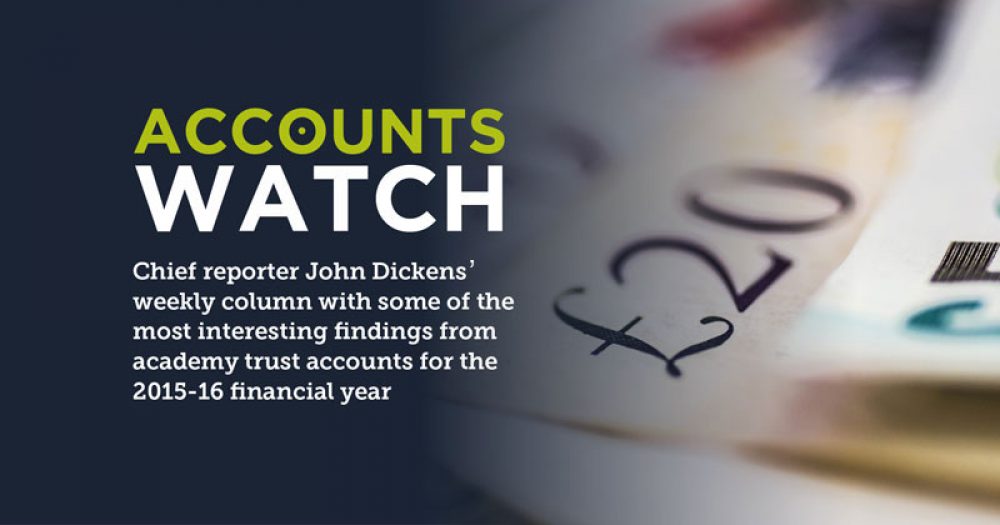Growing numbers of academy leaders, many of them responsible for only a handful of schools, now earn more than £200,000 a year.
In one case a headteacher at a single academy trust is now paid £220,000, while an associate head at the same trust is on £145,000.
A Schools Week investigation also revealed two chief executives running fewer than five schools broke the £200,000 barrier.
But the new findings, based on academy trust accounts from 2015-16, expose stark variations between academy boss pay.
A previous analysis into the pay of the country’s largest 13 academy trusts last year found just three bosses were paid above £200,000 (two of them oversee 50 schools each).
Six academy leaders responsible for more than 30 schools earned less than £200,000.
We don’t want to see a huge salary gap
Malcolm Trobe, interim general secretary of the Association of School and College Leaders, said there was no “rough rule of thumb” on academy chief executive and head pay, and school numbers.
He said remuneration was driven by the often low job security, how challenging the trust’s schools were, and whether leaders would need to oversee expansion.
But he added: “We need to make sure trusts take a realistic view of rewards they are giving to senior leaders. I don’t think we could get a national pay range that represented all the different types of trusts.
“At the same time we don’t want to see a huge gap between the salary level of chief executives and other employees within the institution.”
Colin Hall, head at the Holland Park School Trust, which runs a single 1,400-pupil secondary based in west London, was paid £220,000 last year, up from £190,000 the previous year.
Holland Park became an academy in 2013. Before that, according to a London Evening Standard report into “superheads” in 2011, Hall reportedly earned £130,000.

David Chappell, associate head and accounting officer at the trust, is paid £155,000, up from £140,000 in the previous year.
Amanda Phillips CBE, chief executive of the Paradigm Trust (pictured right), which runs five schools in the east of England, saw her pay rise to £213,018, up from £195,384 in 2015. She was also one of former education secretary Michael Gove’s ‘magnificent seven’ academy leaders.
David Willis, chair of the Paradigm board, said Phillips supervised the principals of four schools and was full-time principal of the fifth, Murrayfield primary academy, which transferred to the trust this month.
He said Phillips was an “experienced leader renowned for her tireless work … often in the most challenging of circumstances”, and had secured a “glowing reputation” for the trust’s schools.
Andy Goulty, executive head and accounting officer for the Rodillian Trust, which sponsors three schools in West Yorkshire, is paid £210,000, up from £190,000. The trust did not respond to a request for comment.
However, John Tomasevic, who heads the Torch Academy Gateway Trust, saw his pay drop by at least £5,000 to between £260,000 to £265,000.
The trust, which runs three secondaries and one primary, refused to comment.
It is vital the best people lead schools
A Department for Education spokesperson said it was for governing bodies to determine the salaries of school leaders, adding it was “vital” the best people led schools.
“That’s why we have given all schools greater flexibility to set staff pay, reward exceptional leaders and attract strong leadership teams to work in the most challenging schools.”
Correction: Schools Week has removed the reference to Sir Nick Weller, chief executive of the Dixons Academies Trust, after clarification it was his total remuneration that equated to £200,000, which included employer pension and national insurance costs. His actual salary was £150,000.








Casino banking! Set their own pay! Huge bonuses! Bosses earning many multiples of their “shop floor” employees! Too big to fail! Dubious practices not putting the customer first! Insider trading! Closing branches where not profitable! Bailed out by the taxpayer when things go wrong!
Banks? No, State School Academy Bosses.
Of course everything you say there could be leveled at local authorities as well, but then that wouldn’t be quite so “on message” would it?
How about Craig Tunstall, paid £375,000 by Lambeth Council to be executive head of the Gipsy Hill Federation (a group of local authority schools)?
The top 6 employees at Lambeth Council share a total in pay and benefits of £1.3m, at a time when the council has been shedding lower paid jobs due to budget cuts. (Credit to https://tinyurl.com/hvjnw8l).
In 2015 Jill Stannard, chief executive of Cumbria County Council, had a package worth £411,025. Kieran Stigant, chief executive of West Sussex County Council, had a package worth £396,143.
These are double and three times the salaries of many Director of Children’s Services responsible for several hundred schools on top of running children’s social care. Many of these local authorities have
90%+ of their children in good or outstanding schools. How is this value for public money? It’s a scandalous waste of public money with no measurable benefit.
Haven’t we been here before?
When I pointed out that the first thing I found online was London Borough of Enfield advertising for a new Director of Children’s Services with a base salary of £138,000 plus up to 10% performance related pay (which would come to a total of over £150,000).
How about Christine Blower receiving a package of over £150,000 from the NUT?
The real problem is that, with the cuts to schools budgets and the high number of academies in deficit, this will mean more teachers losing their jobs and either class sizes increasing or greater use of unqualified teachers. How does this financial mess help improve education? It is becoming clear that the Government has no interest in what they say is their aim.
If Harris can afford to pay its CEO £420k pa, perhaps it could also afford to pay the nearly £6m owing for capital pledges made by Harris pre 2010.
Before I get castigated for my comments above, my thoughts on paying £220,000 to a single academy trust headteacher is that it sounds indefensible. As is paying over £200k to CEOs of MATs with less than 5 schools. I’ve previously commented on my instinct that Dan Moynihan’s salary is exorbitant, but at least there’s a discussion to be had there on value (see SchoolsWeek’s excellent profile piece – http://schoolsweek.co.uk/dan-moynihan-chief-executive-of-the-harris-federation/#comment-101633).
I can’t think that the others represent value for money, but if there is to be change then it requires proper challenge. Personally, I don’t think that throwing around tired old hyperbole (“casino banking”, “triple what a DCS gets”) will get us anywhere. The relevant boards of the MATs should be subject to reasoned scrutiny and asked to justify these salaries, not only for the message they send but because of the obvious consequence that they take so much money away from the pupils.
I have no objection in principle to a CEO being paid £200,000, but it has to be shown that this represents good value – e.g. the job couldn’t be done by two people each paid £75,000. Simply setting a salary level “because that’s what other MATs are paying” is not a valid argument for a Board to make.
You should check out staff turnover at Holland Park. Looks like the governors are asleep at the wheel